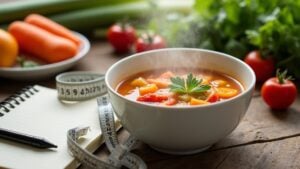Soup has long been considered a diet-friendly food, but some myths twist the truth about its role in weight loss. While broth-based versions can help manage hunger, creamy or sodium-packed soups may do the opposite. The idea that soup alone leads to fat loss oversimplifies nutrition—ingredients and portions matter just as much as exercise and overall eating habits. Comprehension of these five common misconceptions sheds light on whether soup truly fits into a balanced weight loss plan.
Myth: Low Fat/Fat-Free Foods Lead to Weight Loss
Why do low-fat or fat-free foods still leave people struggling to lose weight? Many assume cutting fat guarantees results, but reduced-fat versions often compensate with extra carbs, sugar, or sodium to improve taste. While lower in fat, these swaps might pack similar—or even higher—calories than their full-fat counterparts.
Fat also helps people feel fuller longer by slowing digestion and providing essential nutrients, which keeps cravings in check. Without it, hunger strikes faster, leading to overeating. Weight loss depends on caloric content, not just fat grams. A “fat-free” label doesn’t mean calorie-free, and overloading on such foods can sabotage progress.
Choosing whole, minimally processed options—regardless of fat content—often supports better hunger management and sustainable results. The key lies in balance, not elimination.
Myth: Skipping Meals Aids Weight Loss
Although skipping meals could seem like a quick way to cut calories, it often backfires by slowing metabolism and triggering intense hunger later. Many diets promote meal-skipping as a shortcut to weight loss, but this approach disrupts balanced eating habits.
Whenever the body misses a meal, it conserves energy, making it harder to burn calories efficiently. Later, intense cravings lead to overeating, undoing any calorie deficit.
Research shows that successful weight management often includes regular meals, especially breakfast, to stabilize energy and hunger. A balanced diet with consistent meals helps maintain steady blood sugar, preventing extreme hunger spikes.
Instead of skipping meals, focusing on nutrient-dense, portion-controlled options supports sustainable weight loss without the metabolic slowdown or rebound eating.
Myth: Certain Foods “Melt” Fat
Many diets promise that specific foods like grapefruit or chili peppers can magically “melt” fat away. The truth is, no single food can undo calories or instantly shrink fat.
While broth-based soups or plant-based diet foods might be low calorie, they don’t erase other dietary choices. Sustainable weight loss relies on balanced calorie intake, not quick fixes.
Some soups, like a hearty vegetable soup recipe, can help by providing filling, nutrient-rich options with fewer calories per serving. However, extreme diets, such as the Cabbage Soup Diet, offer short-term results but lack long-term nutrition.
Instead of chasing “fat-melting” Foods, focus on consistency—pairing wholesome meals with activity for lasting change.
Myth: Drinking 8 Glasses of Water per Day Causes Weight Loss
Can drinking water alone lead to weight loss? While water doesn’t directly melt fat, it plays a supportive role in weight management. Staying hydrated helps distinguish hunger from thirst, reducing unnecessary snacking. It also aids digestion and flushes toxins, which can help you lose weight when combined with a balanced diet.
However, relying solely on water—or extreme plans like the cabbage soup diet or bean soup diet—won’t guarantee lasting results. These soup diets can lead to quick water weight loss in a few days, but they lack essential nutrients. For sustainable weight loss, focus on a low-calorie, high-vegetable intake plan. Drinking the right amount of water complements healthy habits but isn’t a magic fix. Balance is key for long-term success.
Myth: Natural Sugars Like Honey Are Fine for Dieting
Natural sugars like honey and maple syrup are often viewed as healthier alternatives to table sugar, but that doesn’t mean they’re free from consequences whenever it comes to weight loss. While they offer some health benefits, they still contain calories that can add up, especially in soup-based diets or dishes with sun-dried tomatoes and olive oil. Medical advice often emphasizes moderation, as even natural sugars can trigger cravings and hinder long-term weight management. Skim milk or others allow for sweetness without Significant Weight gain, but reducing overall sugar intake is key.
| Sugar Type | Calories per Tbsp | Impact on Cravings |
|---|---|---|
| Honey | 64 | High |
| Maple Syrup | 52 | Moderate |
| Table Sugar | 48 | High |
Choosing whole, unprocessed foods helps avoid obscured sugars and supports weight goals.
Conclusion
In the end, soup isn’t a magic potion for weight loss—it’s merely a piece of the puzzle. Like a single ingredient in a recipe, it needs balance to work. Choosing nutrient-rich, low-sodium soups while pairing them with whole foods and movement creates real change. For those diving into the broth of diet myths, clarity is key: no quick fixes exist, but small steps simmer into lasting results.


